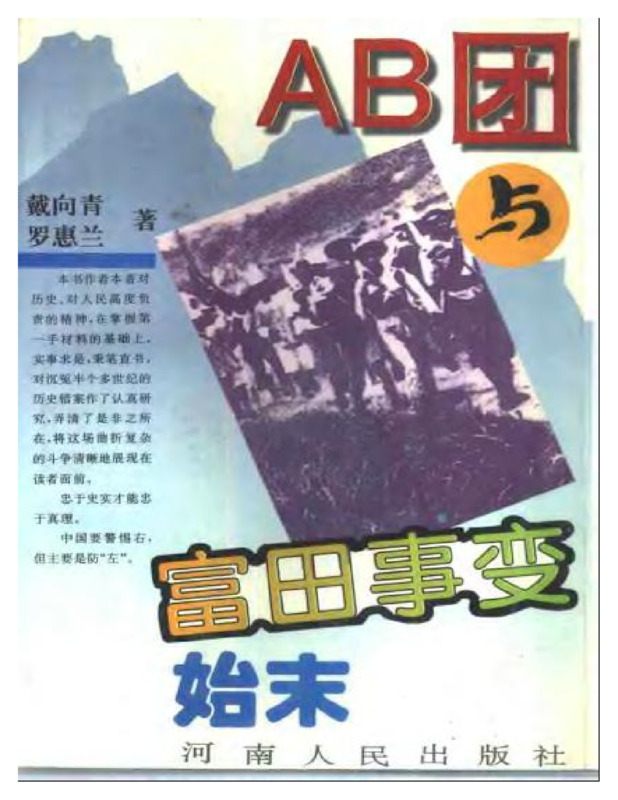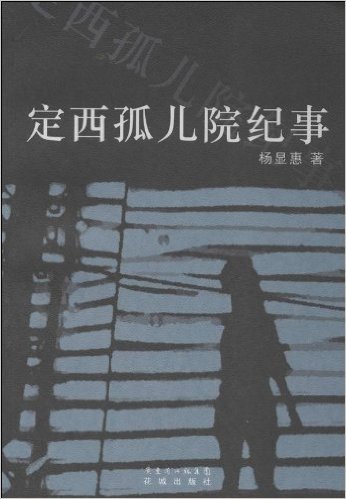Explore the collection
Showing 6 items in the collection
6 items
Book
AB Corps and the Futian Incident
In 1930, a mutiny erupted in the Red Army in the town of Futian. In the ensuring purge, more than 700 officers were executed. After this, the campaign to root out Anti-Bolshevik (AB) groups spread to various parts of China, with 70,000 executed. Occurring just nine years after the founding of the CCP, it is one of the earliest and most significant purges in the party's early history.
The first person to pay attention to the Futian Incident was Professor Dai Xiangqing of the Jiangxi Provincial Party School. Starting in late 1979, he and other colleagues went to southern Jiangxi to collect materials, conduct interviews and investigate, and found that this was an unjust and wrong case, and began to publish articles on the matter.
In the early 1980s, Dai Xiangqing sent his article to a senior general in the PLA, Xiao Ke. After that, the research on the Futian Incident attracted the attention of senior central officials. The CCP's party history research agency sent people to Hunan and Jiangxi to investigate and collect materials. The Organization Department of the Central Committee of the Communist Party of China sent a review team for the Futian Incident and reported the vindication documents to the central government, but even today there is currently no official conclusion on the matter.
This book is an important study of the early history of the Communist Party of China, often mentioned by prominent independent historians, such as Yang Kuisong. As an officially recognized research project, this book does not make ideological breakthroughs, but its detailed historical materials, and its data index make it particularly valuable for understanding this historical event.
This book was published by Henan People's Publishing House in 1994.
Book
Chronicle of Jiabiangou
Jiabiangou was a labor reform farm in Jiuquan County, Gansu Province, where "rightist" prisoners were held. October 1957, nearly 3,000 educated people were detained there. In October 1961, when the higher-ups corrected the "left-leaning" mistakes of the Gansu Provincial Party Committee and began repatriating the rightist prisoners, less than half had survived.
Writer Yang Xianhui spent five years interviewing more than a hundred people and brought to light the truth that had been sealed for more than forty years. Originally published by Tianjin Ancient Books Publishing House in 2002, this book also includes other short and medium-sized stories by Yang Xianhui.
Book
Chronicle of the Dingxi Orphanage
After the disaster in Dingxi Prefecture, which was the hardest-hit area of Gansu Province during the 1958-1960 famine, a children's welfare institution was urgently set up in Dingxi Prefecture to take in hundreds of orphans. During the same period, children's welfare centers or "kindergartens" were set up in all counties and towns in Dingxi Prefecture, as well as in the people's communes in the hardest-hit counties. These children's welfare centers, large and small, housed about 5,000 orphans. On the basis of faithful historical facts and statements by the parties concerned, this book brings tragic scenes of starvation and death before people's eyes using straightforward description, documentary language, and a down-to-earth tone of voice.
Book
Lushan meeting factual record
This book is a historical record of the 1959 Lushan Conference written by Li Rui. Based on the author's personal experience and the literature of the relevant departments of the Communist Party of China, the author has recorded the important points and events before and after the meeting. The first edition of this book was published in April 1989 by the Spring and Autumn Publishing House and Hunan Education Publishing House in mainland China; the updated edition was published in June 1994 by Henan People's Publishing House.
Book
Personal experiences of political movements
This book is a collection of many authors, most of whom were former senior officials of the Communist Party of China, such as Li Rui, Xiao Ke and others. Through the author's recollections, we can learn about the political movements of the Mao Zedong era, including the Cultural Revolution, the Anti-Rightist Movement, etc., as well as the details of many unjust cases, such as the Hu Feng case, which is quite convincing. This book was published by the Central Compilation and Translation Bureau Press in mainland China in 1998.
Book
The Great Leap Forward: An Intimate Memoir
Li Rui, who once served as Mao's secretary, is also an expert on Mao Zedong. Like his famous <i>Proceedings of the Lushan Conference</i>, this book is also an important historical work. It focuses on the author's personal experience of the Great Leap Forward initiated by Mao Zedong.





